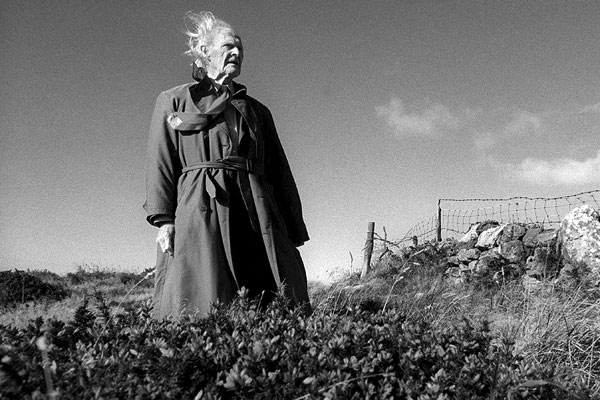There is a much reproduced image of the great Welsh poet R.S. Thomas towards the end of his life. A gaunt and angular figure leans defiantly out over the half-gate of his cottage on the Llyn peninsula, wild of hair, curmudgeonly and altogether unwelcoming. The photograph, taken after Thomas’s retirement as vicar of the fishing village of Aberdaron and relocation to nearby Rhiw, reveals a man at war with the world — and with himself too. Tourists passing through the Welsh-speaking region who asked him for directions encountered the baffling response: ‘No English’. He would return indoors to relish the joke with his monoglot English wife Elsi.
She shared his hatred of the machine age. And so she ripped out the ‘unaesthetic’ cottage radiators, and indoors got inhospitable too. Byron Rogers, in his funny and moving biography The Man who Went into the West (2006), tells us of times when the temperature reached only one degree above zero, even with a fire on, how water oozed down the walls and mould grew on the poet’s shoulders. Elsi, a gifted painter, worked with her feet inside a cardboard box containing an electric stove, burning herself severely on occasion. She died in 1991.
Thomas did not end his life in asceticism, however. He moved around 1994 to be near Betty Vernon who became his second wife two years later, into a comfortable cottage outside Presteigne, on the mid-Welsh border. Here and elsewhere until his death in 2000 he would wear tweed jackets and cavalry twills like the retired English brigadier class for whom, despite all his impassioned Anglophobia, he reserved such strange respect, and whose cold formality he shared. He had a cut-glass English accent. Betty, a Canadian cousin of Lord Longford’s, hunted the fox.
This, the centenary of Thomas’s birth, is a good moment to celebrate his extraordinary poetry and remember his strange life.







Comments
Join the debate for just £1 a month
Be part of the conversation with other Spectator readers by getting your first three months for £3.
UNLOCK ACCESS Just £1 a monthAlready a subscriber? Log in